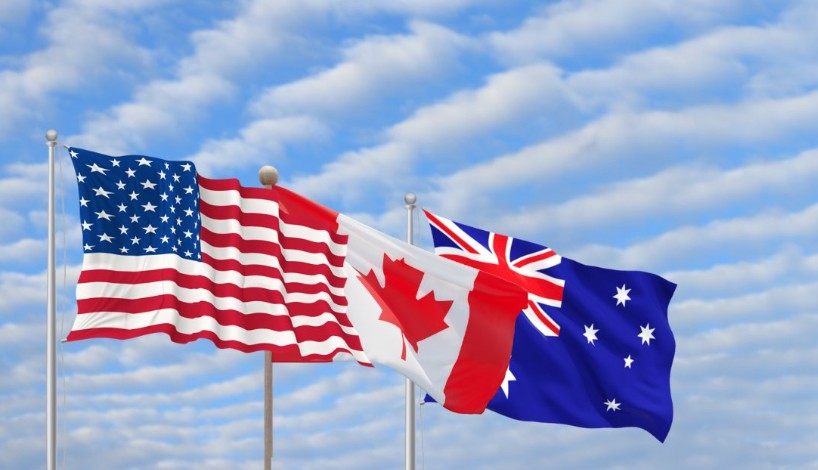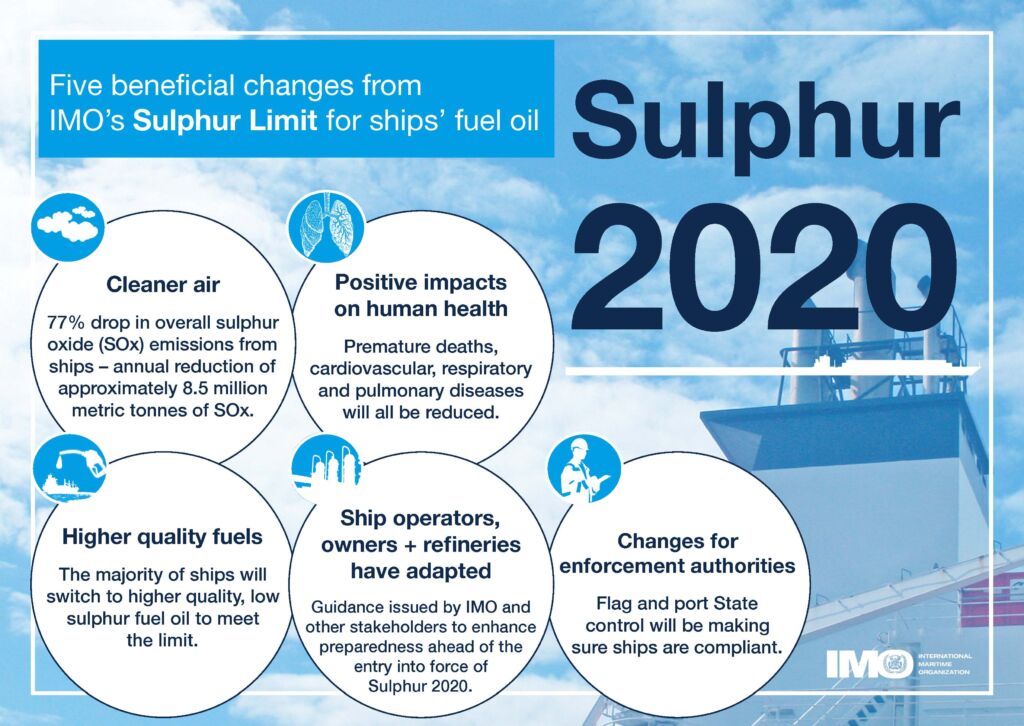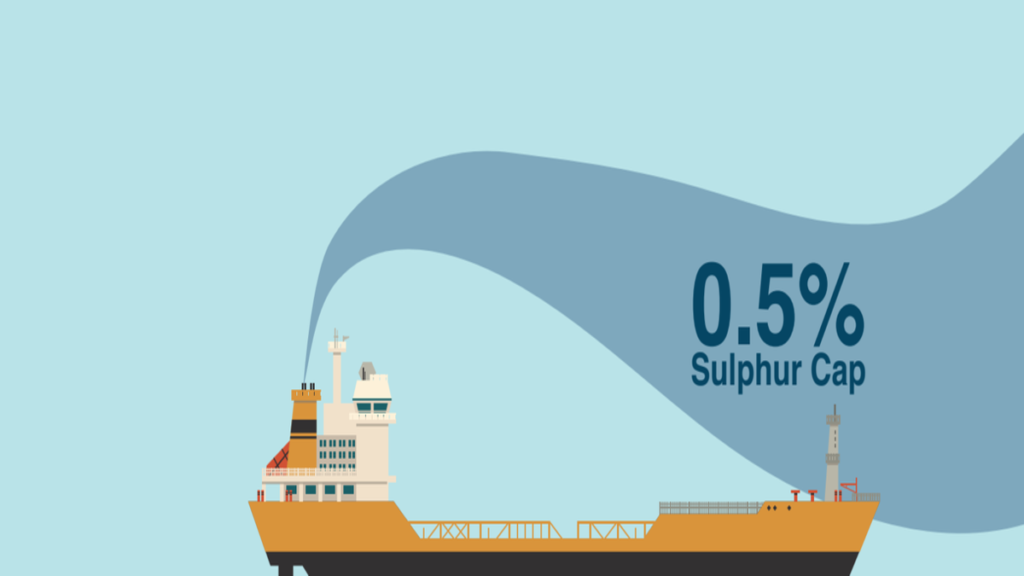
Visa exemptions for certain nationalities rei...
read more

Nearly three years after the IMO regulation limiting shipboard sulphur emissions went into effect worldwide, scrubber washwater discharge in Brazilian ports still raises doubts
Following an amendment to Annex VI of IMO’s International Convention for the Prevention of Pollution from Ships (MARPOL), effective 1 January 2020, vessels operating outside designated emission control areas have had to considerably lower the limits of sulphur oxides in fuel oil used on board, from 3.5% m/m (mass by mass) to 0.5% m/m.
IMO 2020, as the new rule became known, allows alternative fuels and emission control methods to meet the global sulphur cap reduction, such as the installation of exhaust gas cleaning systems (EGCS), also known as “scrubbers”, homologated by the vessel’s Class and meeting the requirements of IMO regulation and guidelines, including monitoring and recording of discharge overboard of washwater generated during the operation of the EGCS unit.
Brazilian federal authorities have not established specific criteria for discharging EGCS waters beyond what the IMO regulation already stipulates. Nevertheless, in the absence of conclusive scientific research or evidence on the impact of scrubbing waters on the marine environment, local port authorities across the country have taken a cautious approach and have banned washwater discharge in their jurisdiction. Yet, in some ports where release is not expressly prohibited, shipmasters and local agents remain uncertain if and where the practice is permitted.
In a recent significant development, Santos Port Authority (SPA) has joined those who have expressly prohibited the operation of open-loop scrubbers and washwater discharges.
IMO 2020 implementation
In November 2019, the Brazilian Navy’s Directorate of Ports and Coasts (DPC) issued a circular implementing the revised regulation aboard vessels taking bunkers or operating in Brazilian waters. It broadly reiterated IMO 2020 guidelines that allow ships to resort to alternatives to burning low-sulphur fuel oils, such as EGC systems. The circular required scrubbers to meet IMO standards and be Class-approved; however, it is silent on the disposal of scrubbing washwater and, to date, there is no federal legislation on the subject.


Temporary ban on scrubbers
In July 2020, DPC clarified that the release of scrubbing water was prohibited throughout Brazilian jurisdictional waters, given the lack of data about its impact on the marine environment. Therefore, vessels equipped with open-loop scrubbers should switch to very low sulphur fuel oil. Those fitted with closed or hybrid units could be used to the extent that they meet IMO guidelines and no washwater is discharged overboard.
Reconsideration
In a swift change of heart, DPC reconsidered its ban on scrubbers just a month later. The maritime authority lifted all restrictions and clarified that the operation of EGCS units should be dealt with according to the relevant IMO regulations and guidelines until more data on the content and effects of washwaters comes to light and the competent authorities further assess the matter.
Shortly after the entry into force of the new regulation, several countries banned or restricted the use of scrubbers and the discharge of washwaters in their ports. Likewise, some port authorities in Brazil are concerned about the potentially harmful effects of scrubbing waters. Still, only a few port authorities spell out any local restrictions, leading ship operators, shipmasters and shipping agents to wonder if and where EGCS units can be used.
While the maritime authority is responsible for regulating the IMO 2020 in Brazil, the Brazilian Institute of Environment and Renewable Natural Resources (IBAMA) understands that, given the lack of broad scientific knowledge and specific regulation, it is reasonable for port authorities to invoke the precautionary principle to ban the new technology.
Vale port terminals
Despite DPC’s reconsideration, Vale maintains its ban on open-loop scrubbers and washwater discharges in its port terminals in Ponta da Madeira, Tubarão, Itaguaí and Ilha Guaíba. Vale recommends vessels calling at these ports switch to IMO 2020-compliant fuel oil and refrain from releasing scrubbing waters within the contiguous zone (24 nm from the coast).
Port of Santos
Until recently, there were no express restrictions on EGCS in the Organised Port of Santos, which raised doubts about whether vessels could use open-loop scrubbers and discharge washwaters in that port.
In response to a query by the local union of shipping agents, Sindamar, SPA eventually clarified that the operation of open-loop scrubbers within port limits requires prior permission from environmental authorities. Closed-loop and hybrid EGCS units may be used, but the discharge of scrubbing water is prohibited in the port.
SPA recommends that, for the use of open-loop scrubbers and discharge of washwaters outside port limits but in territorial waters (12 nm from the shoreline), the Brazilian Navy and IBAMA must be previously consulted.
Other ports
For vessels equipped with EGCS calling at ports elsewhere in Brazil, shipowners should check with local agents to verify any regional restrictions on the use of scrubbers.
State-owned Petrobras, Brazil’s sole bunker refiner and supplier, discontinued production of high-sulphur fuel oils in October 2019 and currently only supplies IMO 2020-compliant fuel oil (0.5% m/m).

Unlawful overboard discharge of effluents may be considered hydric pollution and therefore subject the offender to fines ranging from BRL 5,000 (today about USD 960) to BRL 50 million (USD 9.6 million) without prejudice to civil and criminal liabilities.
The Supreme Court has recently ruled there is no time bar for civil claims for environmental damage.
Please read our disclaimer.
Related topics:
Rua Barão de Cotegipe, 443 - Sala 610 - 96200-290 - Rio Grande/RS - Brazil
Telephone +55 53 3233 1500
proinde.riogrande@proinde.com.br
Rua Itororó, 3 - 3rd floor
11010-071 - Santos, SP - Brazil
Telephone +55 13 4009 9550
proinde@proinde.com.br
Av. Rio Branco, 45 - sala 2402
20090-003 - Rio de Janeiro, RJ - Brazil
Telephone +55 21 2253 6145
proinde.rio@proinde.com.br
Rua Professor Elpidio Pimentel, 320 sala 401 - 29065-060 – Vitoria, ES – Brazil
Telephone: +55 27 3337 1178
proinde.vitoria@proinde.com.br
Rua Miguel Calmon, 19 - sala 702 - 40015-010 – Salvador, BA – Brazil
Telephone: +55 71 3242 3384
proinde.salvador@proinde.com.br
Av. Visconde de Jequitinhonha, 209 - sala 402 - 51021-190 - Recife, PE - Brazil
Telephone +55 81 3328 6414
proinde.recife@proinde.com.br
Rua Osvaldo Cruz, 01, Sala 1408
60125-150 – Fortaleza-CE – Brazil
Telephone +55 85 3099 4068
proinde.fortaleza@proinde.com.br
Tv. Joaquim Furtado, Quadra 314, Lote 01, Sala 206 - 68447-000 – Barcarena, PA – Brazil
Telephone +55 91 99393 4252
proinde.belem@proinde.com.br
Av. Dr. Theomario Pinto da Costa, 811 - sala 204 - 69050-055 - Manaus, AM - Brazil
Telephone +55 92 3307-0653
proinde.manaus@proinde.com.br
Rua dos Azulões, Sala 111 - Edifício Office Tower - 65075-060 - São Luis, MA - Brazil
Telephone +55 98 99101-2939
proinde.belem@proinde.com.br